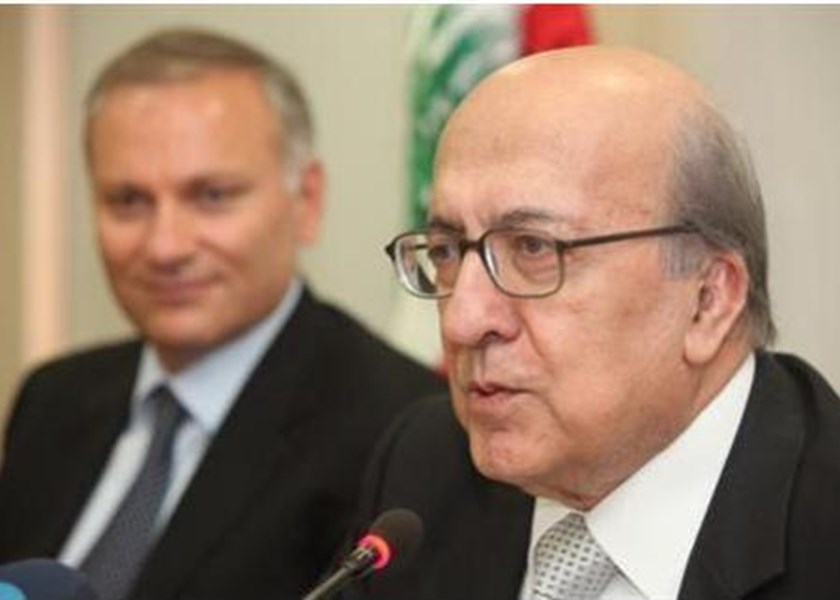
As the crisis in Syria continues, The Daily Star spoke to the president of the Association of Banks in Lebanon, Joseph Torbey, about its impact on the sector.
Q: What was the impact of the Syrian conflict on the Lebanese economy in general and the banking sector in particular?
A: The wave of revolutionary changes that erupted earlier last year in neighboring Syria has cast its shadow on Lebanon’s major macroeconomic indicators, propelling the International Monetary Fund to downwardly revise Lebanon’s projected growth for the years 2012 and 2013 to 2 percent and 2.5 percent respectively, down from 3 percent and 4 percent previously. In addition, financial inflows to Lebanon eased to $11.21 billion up to October 2011 and $12.04 billion in the first 10 months of the year 2012, in comparison with a higher $13.98 billion figure up to October 2010 and $16.51 billion in the same period of 2009. Consequently, Lebanon’s balance of payments have dipped into the red since 2011 after the healthy surpluses it recorded during the previous years, with the BOP deficit reaching $2.13 billion in the first 10 months of 2011 and $2.03 billion up to October 2012.
On the banking sector front, the escalating hostilities in Syria have started to take a greater toll on the performance of Syrian affiliates of Lebanese banks, as is mirrored by the sharp 69.42 percent annual drop in net consolidated profits to around SYP 526.14 million ($7.59 million) in the first three quarters of 2012, and this owing to the increasing provisions on loan impairments. Nevertheless, Lebanese banks continue to reaffirm their historically praised immunity despite the local and regional political upheaval, posting a healthy balance sheet annual growth of 7.05 percent to $149.38 billion as at end of October 2012, an increase of 7.77 percent in customer deposits to $125.01 billion, and an expansion of 9.02 percent in its loans’ portfolio to $42.76 billion.
Q: What measures have Credit Libanais and the banks in general taken to weather the negative effects of the regional tensions and deep political split in the country? Are these measures sufficient?
A: The Lebanese banking sector, including Credit Libanais, is armed with ample liquidity levels, a strong capitalization and a stringent regulatory framework, which altogether shielded the industry from the negative repercussions of the local and regional political instabilities. Banks operating in Lebanon have been adopting efficient risk management (including Basel I, II and III norms) and corporate governance measures in an endeavor to further strengthen their reputation in the eyes of the international community, while continuously engineering new income-generating products and services to maintain their market shares and healthy profitability levels. In this perspective, the Lebanese Central Bank governor has recently announced that BDL is in the process of engineering an incentive scheme of $1 billion to $1.5 billion in the form of soft loans to Lebanese banks to boost lending activity and fuel economic growth. The year 2012 has also witnessed the launching of structured products that are geared toward the attraction of fresh Lebanese-pound deposits at attractive yields, coupled with the issuance of a new series of preferred shares to respond to the capital adequacy requirements of the Basel committee.
Q: If the crisis persists and Lebanon’s political future remains bleak how will it influence the banks in the long run?
A: A prolonged political and economic crisis in the long run would undoubtedly weigh negatively on all economic sectors, with the banking sector being no exception. In fact, and given the unlikelihood of a short-term solution to the current regional bickering, mainly in Syria and Egypt, many banks might be constrained to limit their operations in turbulent markets in an attempt to curb any further possible losses on their books. Nevertheless, we do not expect any worsening economic conditions in 2013 from the aggravation of the Syrian crisis and its spillover on Lebanon given that the Lebanese economy has successfully absorbed the drawbacks of such uprising with resilience, as was translated into lower economic growth which is estimated at around 2 percent for the year 2012. In this context, we do not foresee any further deterioration in Lebanon’s GDP growth in 2013.
Q: What can the government do to bolster the economy?
A: The government can tame the crippling public debt and recurrent budget deficits through embarking on public-private partnership schemes, restructuring the struggling public institutions (Electricité du Liban for instance), improving tax collections, supporting local businesses and industries through certain incentives (i.e. tax exemptions, governmental subsidies, etc.), and encouraging tourism activity by means of cutting airline ticket tariffs and hotel rates, and hosting conferences and business forums, only to name a few.
Q: Lebanese banks still hold a major chunk of government treasury bills and Eurobonds. Will the banks review this strategy or reduce their subscription to more bonds?
A: Lebanese banks have always been committed to financing the government’s needs through continuously subscribing to new issues and rollovers of treasury bills and Eurobonds. In figures, the share of Lebanese banks of local currency-denominated debt continues to outweigh other lending counterparts, with their share standing at 51.8 percent, compared to 16.1 percent for the nonbanking sector and 32.1 percent for the Central Bank as at September 2012. Nevertheless, Lebanese banks are nowadays more inclined toward shorter-term government securities to address any asset-liability mismatch, given the short-term nature of customer deposits in turbulent financial markets, as was recently reflected by the declining rollover ratio in the latest Eurobond issue to 46 percent, down from 64.3 percent in the November 2011 Eurobond exchange. It is, however, worth noting that Lebanese banks have reached some form of equilibrium between claims on the private sector and those on the public sector, with the ratio of private sector loans to public sector claims surpassing the 140 percent mark.
Q: Do you believe that banks’ profits will continue to register high growth and what is your projection for next year?
A: Lebanese banks managed to preserve healthy profitability levels in 2011 and 2012 in spite of the exceptional events that have struck the country and the Arab region since early 2011. More specifically, the Alpha group of banks (top 12 banks) registered a 7.3 percent annual increase in net profits to $1.2 billion over the first three quarters of the year 2012. The robust performance of the banking sector is expected to be sustained during the upcoming challenging year, thanks to banks’ continuous engineering of financial solutions and tailoring of customer-specific products that respond to the ever-changing consumer preferences. The role of the Lebanese Central Bank in closely monitoring the banking sector, and promulgation of new directives, laws, incentives and subsidies, is also crucial for the welfare of Lebanese banks amid the unprecedented hostilities in the region. The prospects of the banking sector remain, however, contingent upon a healthy flow of foreign remittances from the Lebanese diaspora and a continued level of confidence in the economy for the attraction of foreign direct investments.
Q: The government proposed a series of taxes such as raising the tax on interest on deposits from 5 percent to 7 percent. The association of banks rejected this proposal. What alternative measures can the government take to boost revenues and reduce spending?
A: All economic sectors in Lebanon are struggling to cope with the prevailing situation, which necessitates a prudent fiscal policy and wise decisions by the concerned authorities. In this context, any additional or increasing taxes would undoubtedly further paralyze the performance of the economy as a whole, and the banking sector in particular. This has prompted the Association of Banks in Lebanon to criticize the government’s proposal with regards to the suggested fiscal action, of which raising taxes on interest is the thing which would reduce the sector’s appeal and competitiveness vis-à-vis its regional and international peers.
Under the current circumstances, it could be wiser to consider a wider panoply of measures and incentives that can stimulate its revenues and reduce government spending, such as improving its tax collections and tax compliance, restructuring some public institutions, insuring a properly functioning bureaucratic system, increasing efficiency and reducing corruption through partnering with the private sector via PPP schemes, lifting the VAT rate on luxurious products, as well as imposing higher tariffs on selective imported goods, only to name a few.
Q: Can you tell us about the future plans of Credit Libanais? Is the bank considering expanding outside Lebanon?
A: Credit Libanais is keen on further expanding its international foothold and tapping new infant markets, in a quest for potential lucrative investments amid the cutthroat competition and turbulent regional markets. In this context, and after having marked its presence in Cyprus, Bahrain, Canada, Iraq and Senegal, the Group is currently eyeing expansion in non-agitated markets, including sub-Saharan Africa.
